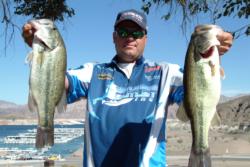Back Story: Kevin Johnson’s Oriental Adventure
You might be a big stick on your home lake, but how would you fare on unfamiliar waters? That’s a question that FLW Outdoors pros answer all the time, either to their dismay or their satisfaction.
Kevin Johnson of Valencia, Calif., put himself to the ultimate test a few years back when he fished a tournament circuit in Japan. And when all the bass were weighed, Johnson had reason to be pleased with himself. He might have become the American equivalent of Shinichi Fukae or Takahiro Omori had he stayed in Japan, but homesickness and his desire to open a boat export business compelled him to return to California.
 Why would an American travel thousands of miles to fish tournaments? Not on purpose, really; mainly it was a convergence of happy coincidences. Johnson, an FLW Tour pro these days, began to fish California tournaments when he was 17 and among his first sponsors was a Japanese lure manufacturer. When he got old enough to be accepted, Johnson joined the Navy and was eventually posted in Japan. While there, he resumed his friendship with his former benefactor, and he was encouraged to fish the World Bass Society (W.B.S.) circuit. Not only did Johnson hold his own in the tournaments, but he qualified for its “Super 3-Day Championship” and placed third in it. He still couldn’t tell you how many pounds of bass he caught in various tournaments, though.
Why would an American travel thousands of miles to fish tournaments? Not on purpose, really; mainly it was a convergence of happy coincidences. Johnson, an FLW Tour pro these days, began to fish California tournaments when he was 17 and among his first sponsors was a Japanese lure manufacturer. When he got old enough to be accepted, Johnson joined the Navy and was eventually posted in Japan. While there, he resumed his friendship with his former benefactor, and he was encouraged to fish the World Bass Society (W.B.S.) circuit. Not only did Johnson hold his own in the tournaments, but he qualified for its “Super 3-Day Championship” and placed third in it. He still couldn’t tell you how many pounds of bass he caught in various tournaments, though.
“The weigh-in amounts were in kilos instead of pounds, so I paid more attention to my placement than how much I caught,” says the 30-year-old Johnson. “Otherwise, the tournaments and the weigh-ins went pretty much as they would in the States, except there weren’t nearly as many fishermen or audiences involved.”
As for the Japanese style of fishing, Johnson says it isn’t any different from how we go about it. Baitcasting tackle is just as prevalent as spinning gear, and Japanese fishermen can flip and pitch with the best of them. Swimbaits, Senkos and shallow-running square-billed crankbaits rank among the most popular lures
The language barrier was a big deal for Johnson, who didn’t know enough Japanese to carry on a conversation with his hosts. Luckily, most of the tournament emcees could speak English and would ask him questions whose answers they then would translate for the weigh-in audiences.
Tournament fishing, whether it involves the W.B.S. or the JB World Series, is a sport for Japanese society’s affluent, or those youthful anglers who have attracted major sponsors. When Johnson was overseas, the JB Top 50 offered the richest purses. The W.B.S. championship paid the winner $10,000. The JB Top 50 championship bestowed the princely sum of $25,000 on the winner.
The W.B.S. championship in which Johnson placed third was held on Lake Kasumigaura, just north of the Tokyo Airport. Kasumigaura is on the opposite side of the country from Lake Biwa where the record-tying largemouth bass was caught in 2009 by Manabu Kurita. Kasumigaura is actually a series of sprawling lakes and the rivers that connect them. In fact, the six W.B.S. qualifying tournaments also are held on Kasumigaura.
“Biwa is the biggest lake, and Kasumingaura is the second biggest lake in Japan,” says Johnson. “Overall, there’s not a lot of lakes in Japan big enough to hold tournaments, which helps explain why bass fishing isn’t as big over there as it is here, in terms of numbers of anglers. But Japanese bass fishermen are just as passionate about the sport as we are. They’re tackle freaks like us, and they put a lot of research and development into their lures and fishing equipment. I really enjoyed spending time with them. They were all super nice to me.”
Now, when he isn’t fishing the FLW Tour, Johnson is rigging up high-performance bass boats to send to Japan. His World Boat Outlet ships about 35 or 40 boats a year to the island nation, most of them to older fishermen who can shell out $70,000 or so for a rigged-out Ranger Comanche 520.
“Owning a modern, fully-equipped bass boat in Japan is an expensive proposition,” says Johnson. “First of all, you’re looking at the base price of the boat, which might start at around $25,000 for a used boat. Then, because you have to have a special trailer license to tow a boat, you shell out another $2,000 for that. And gas runs about $5 a gallon. So bass fishing is something that the Japanese take very seriously.”
As if the guys who have had to fish against Shin Fukae, Takahiro Omori and a few others from the Land of the Rising Sun don’t already know.